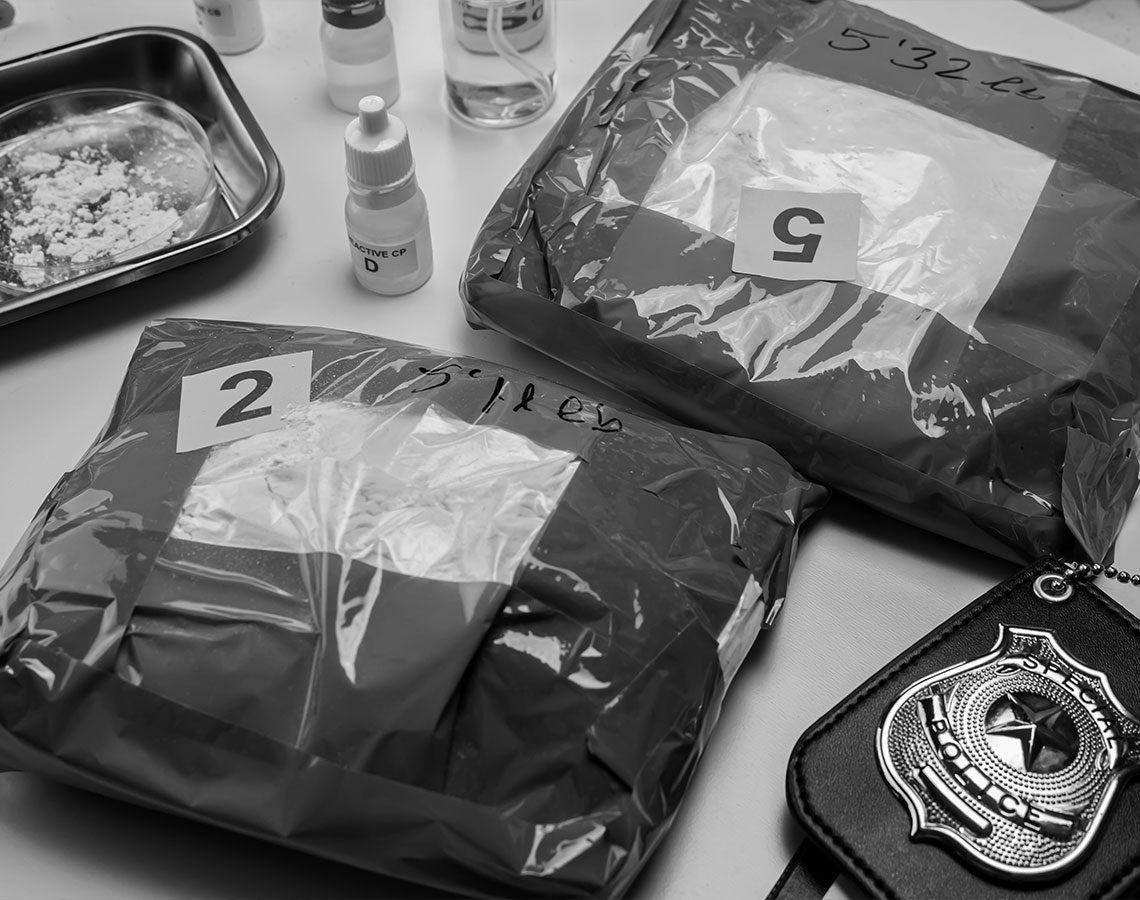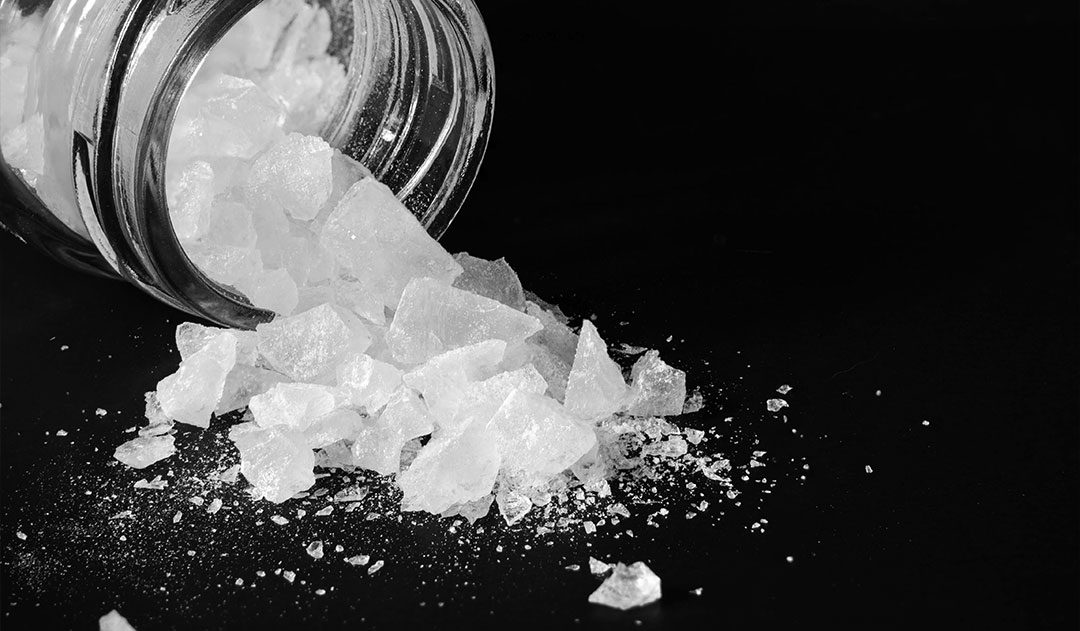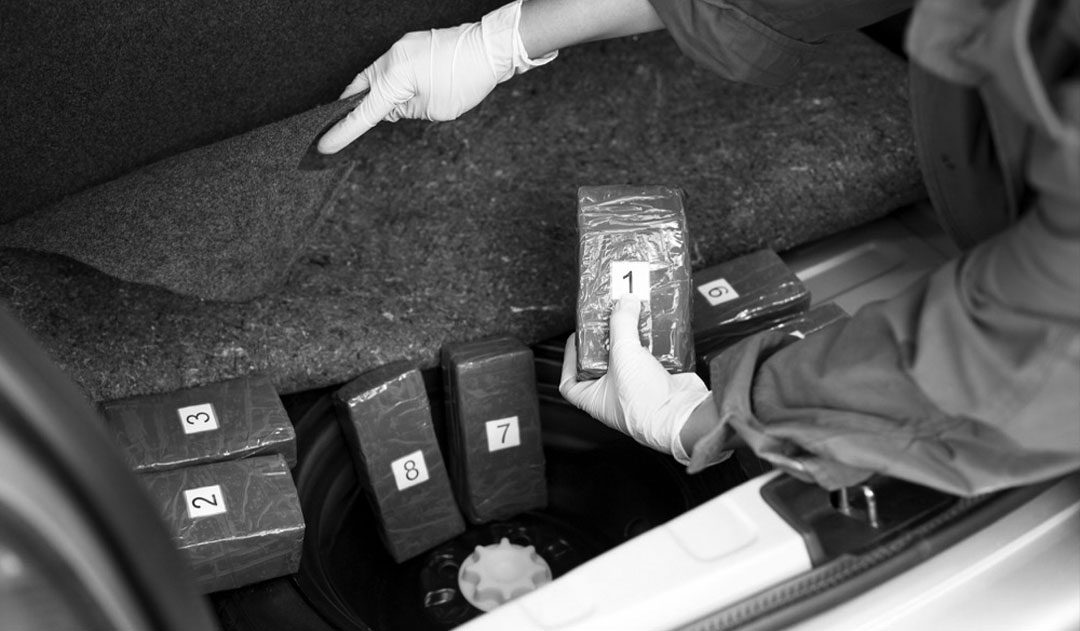Michigan Drug Crimes Defense Attorneys
Defending clients against drug possession, distribution, and trafficking charges for over 25+ years.
Facing drug charges in Michigan can lead to serious legal consequences, but the right criminal defense attorney can make all the difference. Michigan drug laws are among the toughest in the country, and these charges can result in life changing consequences, including: time in prison, massive fines, and permanent felony record, as well as loss of employment, licenses, and custody rights.

Why Choose Barton Morris for Drug Crime Defense?
1. Experts in 4th Amendment Search and Seizure Law
Most drug cases begin with a traffic stop or search. Search and seizure is a critical federal constitutional issue, and must be intensely evaluated for their constitutional legality. Regardless of whether there is a search warrant or not, there are still rules that the police must follow. Police will often rely upon consent searches, but that consent must be freely, voluntarily, and knowingly given. Police will often take advantage of a person’s fear while giving consent, but that is not consent that is delivered freely or voluntarily.
We aggressively challenge unlawful searches and get evidence thrown out when police overstep legal boundaries.
2. Proven Track Record in State & Federal Drug Cases
Because search and seizure issues are largely federal and because federal prosecutions are generally much larger in scope, it’s beneficial to have an attorney with federal criminal experience with drug cases, even for state prosecutions. Attorneys experienced in litigating these issues at the federal level will be much more effective when handling Michigan state drug crime defense.
3. Michigan’s Only Certified Forensic Lawyer-Scientist
Barton Morris is the only attorney in Michigan certified by the American Chemical Society as a Forensic Lawyer-Scientist. This distinction gives him as an expert in challenging lab reports, toxicology results, and forensic misidentification. This unique expertise sets him apart in this field, giving you best defense possible.
Why You Need Michigan’s Only Forensic Lawyer-Scientist Criminal Defense Lawyer
Forensic evidence is usually scientific-based evidence which is very common in every drug case. The identification and weight of the substance involved is always an issue, so the measurement and identification methods become very important.
For instance, in drug cases, we find that many controlled substances are often combinations of many different compounds. It can be very important as it relates to the mitigation of the offense characteristics, or a complete defense to the case, to understand the reliability of that measurement and identification.
If the government is claiming a certain controlled substance is fentanyl, but in fact, the majority of it is heroin, the government is being misleading, and that evidence contains a significant mitigating circumstance. Similarly, Michigan State Police recently were performing scientific analysis on the identification and amount of THC in somebody’s blood but in fact, they couldn’t reliably distinguish between CBD and THC.

Michigan Drug Classification and Penalties
The state of Michigan classifies narcotics into five categories called “schedules,” ranging from Schedule I (identified as having high potential for abuse and no medical value) to Schedule V (low-risk drugs, often available over the counter). There are many circumstances that may result in drug crime charges, including possession, drug trafficking, use, prescription fraud, manufacturing, and distribution.

Felony Drug Charges in Michigan
If you are facing felony drug charges in Michigan, it is important to know that the consequences are much more serious. A felony conviction can lead to a prison sentence of up to life in prison, as well as hefty fines and a criminal record that will follow you for the rest of your life. Some of the most common types of felony drug charges in Michigan are:
Manufacture of a Controlled Substance
- This charge is given if you are caught manufacturing drugs.
Delivery or Possession with Intent to Deliver a Controlled Substance
- This charge is given if you are caught selling drugs or possessing them with the intent to sell.
Possession of a Large Amount of a Controlled Substance
- This charge is given if you are caught with a large amount of drugs in your possession.
Misdemeanor Drug Charges in Michigan
If you are facing misdemeanor drug charges in Michigan, the penalties are less severe but still serious. The first thing you should know is that you have the right to an attorney. If you cannot afford one, the court will appoint one for you. There are a few different types of misdemeanor drug charges in Michigan:
Possession of a Controlled Substance
- This is the most common type of misdemeanor drug charge. It simply means that you were caught with a small amount of drugs in your possession without the intent to sell or distribute.
Possession of Drug Paraphernalia
- This charge is usually given if police find items like pipes, bongs, or syringes in your possession.
Use of a Controlled Substance
- This charge is given if you are caught using drugs, regardless of the amount in your possession.

Specific Drug Crimes We Defend

Cocaine Charges
Possession of cocaine is a felony, and the state of Michigan aggressively prosecutes cocaine charges. According to the DEA, cocaine is a Schedule II drug, meaning that it’s considered to be dangerous and has a high risk of abuse. Schedule II drugs are also identified as having a high potential for severe physical or psychological dependence.
Possession of cocaine is determined by whether or not you have control over the drug. This means that you can be charged with possession even when the drug is not physically on your person. For example, if it’s found in your home, car, or office, you potentially could be charged with possession.
Penalties for cocaine possession in Michigan:
- Possession of fewer than 50 grams: Imprisonment up to four years and/or a $25,000 fine
- Possession of 50 to 449 grams: Imprisonment up to 20 years and/or $250,000 fine
- Possession of 450 to 999 grams: Imprisonment up to 30 years and/or $500,000 fine
- Possession of 1,000 grams or more: Life imprisonment and/or $1,000,000 fine
Delivery of Cocaine
If you’re charged with delivery of a controlled substance in Michigan, such as cocaine, you’ll be facing a felony charge according to Michigan law. The penalties are very severe. Common delivery of cocaine charges and penalties include:
- Delivery of less than 50 grams of cocaine is a 20-year felony with a fine of up to $25,000.
- Delivery of between 50–450 grams of cocaine is a 20-year felony with a fine of up to $250,000.
- Delivery of between 450–1000 grams of cocaine is a 30-year felony with a fine of up to $500,000.
- Delivery of more than 1,000 grams of cocaine is a possible life sentence felony with a fine of up to $1,000,000.

Heroin Charges
If you’ve been arrested for the illegal use or possession of heroin, or other heroin charges such as distribution or manufacturing, you need experienced legal representation. As a Schedule I drug, heroin charges are prosecuted aggressively.
As an opiate, heroin is considered to be especially dangerous. The overdose risk is extremely high, and the potential for addiction is equally severe. It’s also believed to have no medical use. For these reasons, heroin has been classified as a Schedule I drug, along with LSD, marijuana, ecstasy, and peyote.
Heroin-related offenses that can result in fines and/or prison time include:
- Using heroin
- Failing a drug test
- Possession of heroin
- Selling or manufacturing heroin
- Distributing or trafficking heroin
- Selling heroin to a minor or near school property
Heroin Trafficking and Distribution
A conviction for heroin trafficking involving:
- 100+ grams carries a mandatory 5-year prison sentence
- 1,000+ grams carries a 10-year minimum sentence

Ecstasy Charges
Known mostly as a party drug, many people are unaware that ecstasy is a Schedule I drug. In Michigan, prosecutors prosecute ecstasy charges very aggressively, and there are very severe penalties associated with a conviction.
While ecstasy is designed to create a sense of euphoria, some dangerous side effects include:
- Body temperature regulation issues
- High blood pressure
- Rapid heartbeat
- Panic attacks
- Memory loss
- Depression
- Psychosis
- Seizures
Trafficking Ecstasy and Distribution
Trafficking ecstasy and distribution conspiracies are aggressively investigated and prosecuted in federal court. The active ingredient is MDMA but other drugs are often sold under the same name including BZP, MDA, and MDEA.
BZP is a substance that’s often used in ecstasy as a substitute for MDMA. BZP is legal in Canada, therefore, it’s more frequently found in the Eastern District of Michigan. The substance is unlawful under federal law but isn’t as heavily penalized. The penalty for 500 pills of BZP is the equivalent of 100 pills of MDMA (21 months – base offense level 16).

Methamphetamine Charges
Methamphetamine (crystal meth) is a Schedule II stimulant associated with severe health risks and high addiction potential. Charges involving meth can trigger prison time, asset forfeiture, and possible loss of parental rights if CPS is involved. Its popularity has increased due to its low cost and intense high, and much of the meth in Michigan comes from out-of-state trafficking routes. Prosecutors are aggressive, and judges often impose harsh penalties to curb its spread.
Common drug crimes associated with meth include:
- Use of methamphetamine
- Trafficking of methamphetamine
- Possession of methamphetamine
- Intent to manufacture methamphetamine
- Manufacturing and maintaining a meth lab
- Distribution and selling of methamphetamine
Methamphetamine Trafficking and Distribution
Crystal meth is a synthetic stimulant drug that has been steadily growing in popularity across Meth trafficking is the second most common federal drug offense, behind only cocaine. Most cases involve 5–10 pounds of meth and are investigated by the DEA, FBI, or Border Patrol. Possession of 5+ grams of pure meth or 50+ grams of a meth mixture carries a mandatory 5-year prison sentence.
The average sentence for federal meth trafficking is about 8 years. Because meth is often part of larger conspiracy cases, federal prosecutors will aggressively pursue all involved parties—making experienced legal defense critical.

Prescription Drug Charges
Possessing prescription medication without a valid prescription in your name can lead to felony charges—especially if the drug is a Schedule I or II controlled substance. Common examples include OxyContin, Dilaudid, Vicodin, and Demerol.
If you’re unable to prove legal possession during a traffic stop or arrest, you could face serious criminal penalties, even for small amounts. Convictions often include steep fines, jail time, and a permanent criminal record. These cases demand swift action from an experienced Michigan drug crimes attorney to protect your rights and explain your medical circumstances if relevant.
Some of the penalties upon conviction include:
- 4-year felony for possession of fewer than 50 grams
- 20-year felony for possession of 50 – 450 grams
- 30-year felony for possession of 450 – 1000 grams
- Life-sentence felony for possession of 1,000 grams or more
In addition to possession, you might also be dealing with other prescription pill charges, such as fraudulently obtaining a prescription, falsified prescriptions, selling prescription drugs, or the distribution of prescription drugs.
Prescription Pills Trafficking and Distribution
Prescription drug diversion—when legally obtained medication is resold or given to others—is prosecuted harshly in federal court. Defendants often include doctors, pharmacists, clinic employees, and patients caught participating in illegal prescription sales. Investigations led by the DEA or FBI often rely on informants, surveillance, and prescription tracking through Michigan’s MAPS database. Agents look for patterns like overprescribing, pharmacy hopping, and high-volume dispensing to build cases.
These patterns include:
- Multiple patients receiving the same combination of controlled substances
- The use of multiple pharmacies by patients to fill prescriptions
- Individuals traveling outside the area in which they live to fill prescriptions
- Excessive numbers of identical prescriptions in different names prescribed by the same doctor and filled by the same pharmacy
- Patients obtaining excessive amounts of controlled substances over an extended period of time
- Patients obtaining similar prescriptions from multiple doctors
- Patients receiving the maximum dosage for a narcotic or other controlled substance with no titration or “ramp up” or trial period
- Patients receiving multiple prescriptions simultaneously for different opiate-based narcotics or other substances with a known street value
- Patients involved in drug distribution conspiracies obtaining medications from specific doctors
- Doctors changing their prescribing habits in line with current street desire or highest street value of certain controlled substances
Federal law enforcement can easily receive this data through MAPS – Michigan Automated Prescription System. MAPS records all the information regarding all prescriptions filled in Michigan, including the doctor information, assigned DEA number, pharmacy, all patient information, drug, dosage, date filled, quantity, and refills.

Drug Trafficking
Drug trafficking in Michigan includes the manufacture, distribution, and sale of controlled substances and is considered a felony offense. Penalties depend on the type and quantity of the drug, with Schedules I and II carrying up to 20 years in prison and fines reaching $250,000 or more. Prosecutors often attempt to categorize drugs in a higher schedule than appropriate, which can increase sentencing. As a skilled Michigan drug trafficking attorney, we will scrutinize these classifications and ensure your charges are accurate and legally defensible
Drugs are categorized by their potential for abuse:
- Schedule I: LSD, ecstasy, heroin, GHB, hallucinogenic mushrooms
- Schedule II: Cocaine, opium, morphine, OxyContin, Adderall, hydrocodone
- Schedule III: Anabolic steroids, Vicodin, Tylenol, codeine
- Schedule IV: Valium, Rohypnol, soma, Ambien, Xanax
- Schedule V: Ephedrine and codeine, such as those found in cold medicine and cough syrups
If your charges include drug trafficking, these charges are much more severe than just possession. A drug trafficking lawyer who has plenty of experience with drug trafficking cases in their portfolio will be advantageous to you in court as a prosecutor will use every detail they can come up with to prove that you had the intent to sell the substances.

MCL 333.7411 Deferral Program
MCL 333.7411, commonly known as a 7411 deferral, allows first-time drug possession offenders to avoid a criminal record. Defendants who plead guilty can have their case dismissed after completing probation, with no public record of the conviction.
Probation terms vary based on the judge but may include drug testing, monthly reporting, or even non-reporting. Our attorneys have successfully negotiated reduced probation terms for eligible clients. This option avoids license suspension and eliminates the need for future expungement.
Benefits of a 7411 deferral include:
- Your entire case will be dismissed.
- There will be no public record of your case.
- You can avoid the mandatory one-year license suspension that comes with all drug possession convictions.
- Since the charge never goes on your record, you won’t have to go through an expensive and tedious expungement process to try and get it removed later.
It’s important to know that a 7411 deferral cannot be used in delivery, manufacturing, or intent to sell drug convictions.
We Fight to Keep Families Together
As you can see, the cost of conviction is steep. In addition to astronomical fines, you’re also facing a felony conviction on your record and separation from your family and community.
We know how devastating a conviction can be, and we work tirelessly to provide our clients with the rigorous defense they need. Our Michigan drug crimes lawyers advocate for rehabilitation over punishment. We don’t believe that one instance of mistaken judgment should define a person’s life.
Request Your Free Consultation Today
If you are facing drug charges or are unhappy with your current attorney, request a free consultation now. We will explain why we will achieve better results than other criminal drug crime defense lawyers.
Contact the Law Offices Of Barton Morris today for a free consultation!
Free Consultation
Associations & Credentials
Our attorneys possess extensive education and accreditations that set us apart from other firms.
Barton Morris is Michigan’s only Forensic Lawyer-Scientist, as certified by the American Chemical Society
- One of only a few dozen certified nationally
- Member of the American Chemical Society, Chemistry and Law Division
- Member, American Academy of Forensic Scientists
Trial Expertise through Experience and Education
- Trial Lawyer’s College Alumni F Warrior Board Member, Region 7 2013-2016
- Graduate, Trial Lawyers College, Dubois, Wyoming, September 2011
- Graduate of the Criminal Defense Attorneys of Michigan, Criminal Defense College, August 2010
- Graduate of the National Criminal Defense College, Macon, Georgia, June 1999
President – Michigan Association of OWI Attorneys
- Michigan Association of OWI Attorneys, Inaugural and Board Member
- Charter Member and Faculty, DUI Defense Lawyers Association
Selected by State Attorney General Dana Nessel to be a Member of Marijuana Legal Workgroup (2019)
- Guided development of DUI of Marijuana legislation
- Corrected common misbelief that THC levels measure level of impairment
